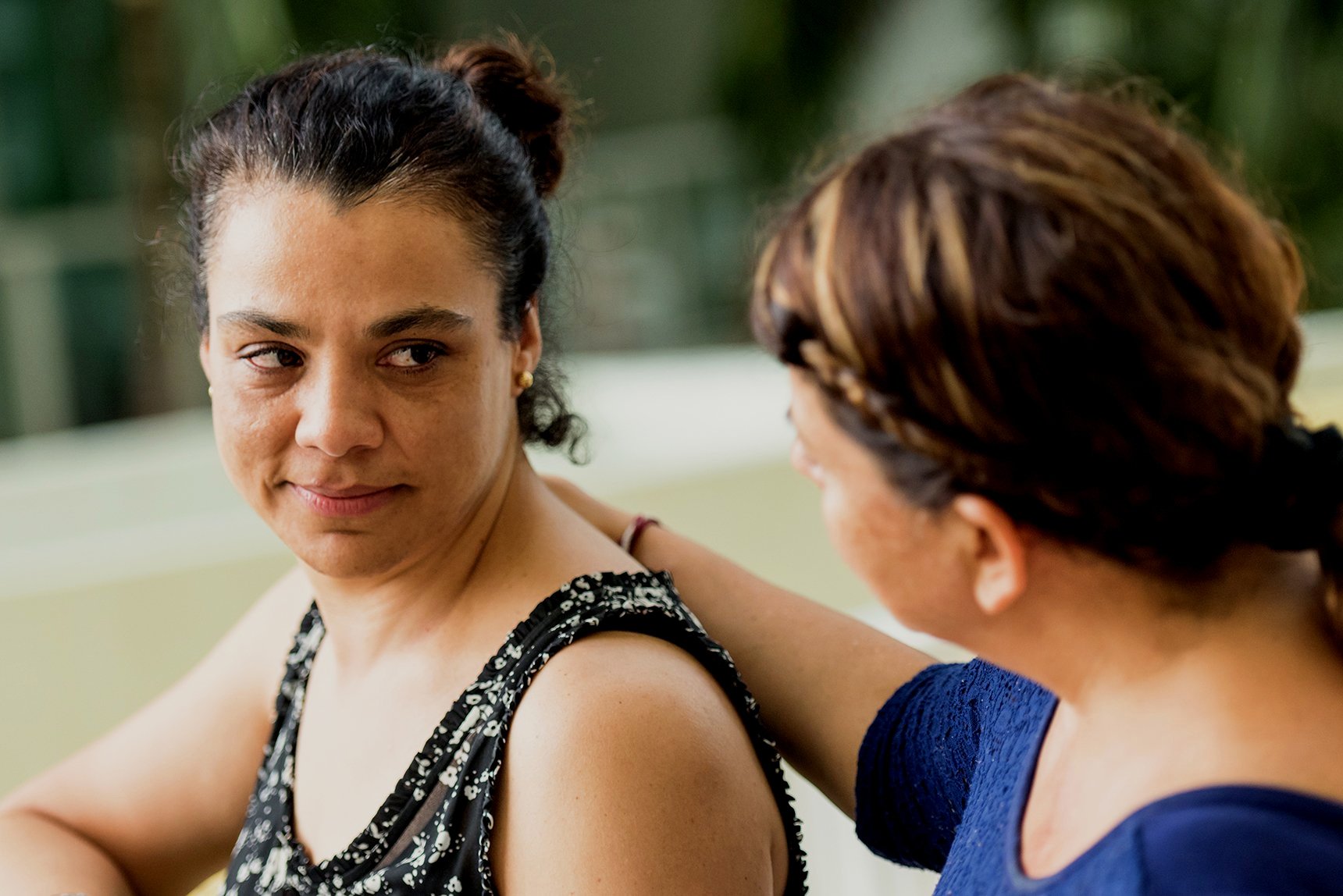
Domestic and Sexual Violence Services
YWCA reaches 1 million women, girls and their families through more than 194 local associations in 45 states and the District of Columbia. We provide critical programs, including domestic and sexual violence services, through 12,500 staff members and 52,000 volunteers.
More than 150 YWCAs across 44 states provide gender-based violence services. Every year, in communities big and small, YWCAs get up and do the work of providing safe and secure housing, crisis hotlines, counseling, court assistance, and other community and safety programs to more than 535,000 women, children and families.
A Snapshot of Our Services
YWCA is creating a safer, more just world, by offering emergency, transitional, and long-term housing, crisis hotlines, medical and legal advocacy, and other services to survivors of domestic and sexual violence so survivors can regain stability and as they rebuild their lives.
Financial Literacy Skills
Financial education and coaching helps survivors help survivors obtain greater financial stability by learning about budgeting, credit and debt issues, and developing the skills and resources needed to work towards independent financial futures. With the support of one of our partners, the Allstate Foundation, in 2010 every YWCA in the country was provided a financial literacy curriculum: “The Allstate Moving Ahead through Financial Management Curriculum.” The curriculum includes tools and information designed to empower victims of domestic violence and people of all incomes to be self-sufficient with their finances.
Medical and Legal Advocacy
YWCA advocates provide emotional support and information during the medical and criminal justice procedures to domestic and sexual violence survivors. Legal advocates can assist clients with domestic violence petitions, accompany clients to court for hearings for protective orders, criminal hearings, and other civil hearings; and attend police and prosecutor follow-up interviews with victims if requested. Medical advocates provide 24-hour support to survivors at hospitals, as well as local clinics and doctor’s offices.
Case Management/Referral
Survivors of sexual and domestic violence are often in need of multiple community resources. YWCA case management services help to identify, plan, and facilitate access to resources that meet the needs of survivors and their families.
Job/Work Skills Training
A significant barrier for many individuals wanting to leave a violent home is having inadequate financial resources. YWCAs help survivors secure stable employment by providing support through job readiness skills training, job training and placement, resume development, application assistance, and interview preparation.
Family Justice Centers
Several YWCAs also provide services in conjunction with Family Justice Centers, which provide all of the services that victims, survivors, and their families need, all in one place – including crisis lines, counseling and case management, legal and court advocacy, shelter, legal assistance, law enforcement, prosecutors’ offices, victim witness units, victims’ compensation, safety planning, information and referral to resources, financial assistance, and other community services.
Housing
YWCA is creating a safer, more just world by offering safe and secure emergency shelter, transitional housing, and long-term housing to victims and survivors of gender-based violence so they can avoid homelessness and rebuild their lives. In many communities, YWCA is the only provider of housing for domestic violence survivors. The fact that 1 in 4 women is homeless because of violence committed against her, and more than 92% of homeless mothers have experienced severe physical and/or sexual abuse during their lifetime makes YWCAs services even more crucial.
Crisis Hotlines
YWCA crisis hotlines and chat lines are vital resources for survivors of sexual and domestic violence. They provide assistance through crisis intervention and support by helping to identify problems, priorities, options, and possible solutions, including helping to make plans for safety and action; information about resources on healthy relationships, domestic violence, and sexual assault; and referrals to domestic violence shelters and programs, social service agencies, legal assistance agencies, and other relevant services.
Counseling
Counseling helps survivors to address the traumatic impact that violence has had on their families, as well as to secure long-term therapeutic interventions.YWCAs around the country offer adult and child counseling, helping to break the cycle of violence through the provision of trauma-informed services.
Supervised Visitation / Safe Exchange
For survivors with children in common with their abuser, shared custody or visitation arrangements can be frightening, or even dangerous. Many YWCAs around the country provide a safe, secure, child-friendly, and culturally-accessible environment for parents to visit or exchange their children when domestic violence, sexual assault, child abuse, or stalking has occurred within the family.
Community and Prevention Education
Around the country, YWCAs offer prevention education to schools, agencies, companies, organizations, and professionals. Prevention education helps to prepare students, teachers, parents, professionals, and community members to recognize and prevent abusive behaviors. YWCAs also provide information and training on the dynamics of domestic violence and how to provide support if an incident of violence occurs.
Our Impact
256,744 total served from prevention programs focused on sexual assault, trafficking, domestic violence and more.
61% are Women and Girls
Our Legislative Priorities:
Safety from Gender-Based Violence
Women and girls of all ages, income levels, racial and ethnic communities, sexual orientations, gender identities, and religious affiliations continue to experience violence in the form of domestic violence, sexual assault, dating violence, stalking, and trafficking.
As the largest network of domestic violence service providers in the United States, YWCA works for practical legislative and policy solutions to protect survivors, hold perpetrators accountable, and eradicate all forms of gender-based violence.
Week Without Violence
National Campaign
At YWCA, we are eliminating racism and empowering women. Since 1995, YWCAs across the country and their supporters assemble the third week of October for a Week Without Violence, a global movement in partnership with WorldYWCA to end violence against women and girls.
Events range from engaging complex dialogues to workshops, community service opportunities, and public awareness exercises. All activities tackle a central theme, which is the pervasive and intersectional nature of gender-based violence and its impact on our communities.
Additionally, because some gender-based violence goes unacknowledged, under reported or does not receive the same sense of urgency, sensitive subjects such as intimate partner violence, sexual assault, trafficking, and harassment are addressed as well. Every year we ask suvivors, partners and allies to Mmobilize with us during our Week Without Violence, as we raise our voices as a force for change.
Our Work in Action
“You have given me security. That is something I haven’t had much of in my life. Every scar I carve, I wear as a badge. It gives me something to look at and tells me I can get through whatever comes my way. Every ounce of power and energy I gave to my husband, I am now taking it all back! I can’t say thank you enough for the gifts you have given me.
”
“The YWCA was there to help my family in our time of need. My mom had a YWCA attorney represent her for her final protective order that she obtained against my father. She also had the benefit of YWCA support groups to help her understand she was not alone as a survivor. Today, I am a stronger advocate on behalf of my clients because of what I saw my mom go through and what my family went through.
”
“A family friend had approached the girl at a relative’s house and attempted to touch her and remove her clothing. The girl revealed that she had shouted “No, stop” before immediately leaving the room to seek a trusted adult. When I asked, Where did you learn how to do this?” The young girl said, “From you. You came to my class and taught me the lesson.”
”
Key YWCAs in DV/SA
-
YWCA Cass Clay, in the Fargo-Moorehead area, where affordable housing for large families is hard to come by, has grown the number of apartments offered under the YWCA umbrella by over 270% during the past 4 years. For example, in August of 2019, they opened a new permanent supportive residence called Grace Garden, which is fully furnished and provides secure housing, case management, and services to approximately 75 survivors of domestic violence and homelessness. The housing is offered without time limits, allowing residents to gain stability as they rebuild their lives.
-
YWCA Pueblo’s Teresa’s Place: Visitation and Safe Exchange Program provides a safe and secure place for parents to visit or exchange their children when domestic violence, sexual assault, child abuse or stalking has occurred within the family. This unique setup is designed to assure that children affected by an abusive relationship can have safe contact with the absent parent without having to be put in the middle of their parents’ conflicts or problems. This allows children to maintain a relationship with both of their parents—an important factor in having a positive adjustment during family dissolution.
-
At YWCA YWCA Nashville & Middle Tennessee, Re-New offers survivors of domestic violence who leave their Weaver Domestic Violence Center a fresh start. Because most survivors leave shelter and transitional housing with nothing, it can be months before they can furnish a new home. RRe-Newe-New solves this problem. Armed with furniture donations, a team of volunteers redecorates the survivor’s new home, complete with a pantry full of food and a fully-stocked refrigerator, prior to the move-in date at each Re-New apartment.
-
The Legal Services team at YWCA Pierce County provides free civil legal advocacy, representation, and referrals to domestic violence survivors with civil legal issues, increasing their chances of permanently and safely ending their violent relationships and establishing lives free of violence. The legal program is able to help survivors with legal issues related to divorce/legal separate, child custody/parenting plans, child support, spousal maintenance, modifications, contempt, paternity, and address confidentiality, and protection orders.
-
Since 1985, YWCA Lower Cape Fear’s New Choices program has supported domestic violence survivors in the Cape Fear area who are taking steps toward financial independence and self-sufficiency. The program uses Allstates’s Moving Ahead Through Financial Empowerment curriculum to empower survivors to recognize financial abuse, build and use or repair credit, create a budget, make informed financial decisions, effectively manage personal finances, and prepares them for opportunities for financial growth through microenterprise solutions.
-
The Immigrant Survivors of Partner Violence (ISPV)program at YWCA Cincinnati offers community outreach, technical assistance, expertise training on immigrant issues, cultural sensitivity, language access, and the ability to provide direct service and case consultation to immigrant survivors of partner violence. ISPV has over 20 partner agencies that work to develop prevention and intervention programming and to coordinate services for immigrant or Limited English Proficiency (LEP) victims in the community to ensure they have access to necessary resources.
-
Several of our programs focus on engaging men and boys to end the culture of violence against women. For example, YWCA Knoxville and the Tennessee Valley, Gamechangers is a mentoring program that teaches boys and young men about healthy and unhealthy relationships, violence in relationships, skills for speaking out when they witness violence against women, and more. AMEND Together at YWCA Nashville & Middle Tennessee dedicated to ending violence against women and girls by engaging men and boys to be a part of the solution. It seeks to seek to challenge the culture that supports violence by cultivating healthy masculinity.
Our GBV Work in the News
The Ms. Q&A: Alejandra Y. Castillo on Combating Domestic Violence During the COVID-19 Epidemic
NowThis Facebook – How to Support Domestic Violence Survivors During COVID-19
NowThis Twitter – How to Support Domestic Violence Survivors During COVID-19
NBC News – Police see rise in domestic violence calls amid coronavirus lockdown
Week Without Violence Podcast Miniseries


